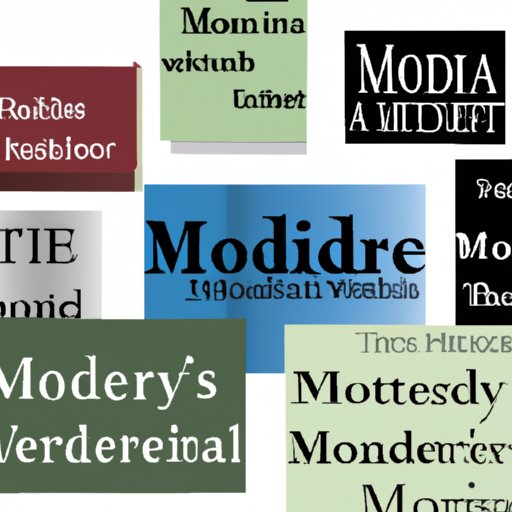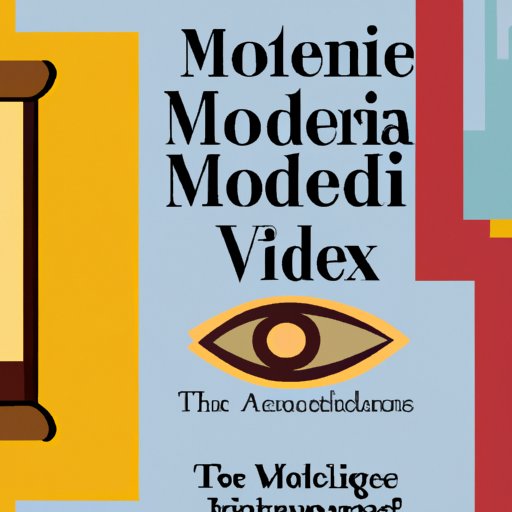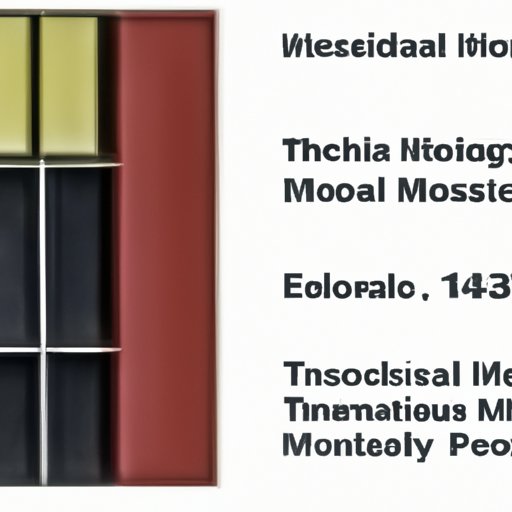Introduction
Modernism is a literary movement that began in the early twentieth century and had a profound influence on the course of literature. It is characterized by a rejection of traditional values and a focus on the exploration of psychological and emotional themes. This article will provide an overview of modernism in literature, examining its historical emergence, key themes and styles, and its lasting influence on writers and literary criticism.

A Historical Overview of Modernism in Literature
Modernism emerged as a response to the devastation caused by World War I. According to Professor Thomas C. Foster of Grand Valley State University, “The war caused a shift in thinking and writing because the events of the war were so extreme, so far beyond anything that had been experienced before.” As thinkers and writers grappled with the horror and trauma of the war, they began to develop new ways of understanding and expressing their experiences.
At the same time, new technologies were beginning to emerge that would shape the modernist movement. The invention of the telephone, radio, and talking film changed how people interacted with each other and the world around them. These new forms of communication allowed for a greater exchange of ideas and helped to spread the modernist movement around the globe.

Examining the Themes and Styles of Modernism in Literature
Modernist writers explored a variety of themes and styles in their works. One of the most prominent styles was stream-of-consciousness writing, which allowed authors to express their inner thoughts and feelings in a more direct way. Writers such as James Joyce and Virginia Woolf used this technique to explore the depths of their characters’ psyches and emotions.
Another key feature of modernism was experimentation with form and narrative structure. Writers began to challenge traditional conventions and create works that blurred the lines between genres. They also incorporated elements of symbolism and allegory into their works to convey deeper meanings and explore complex philosophical ideas.

Exploring the Influence of Modernism on Contemporary Literature
Modernism had a significant influence on subsequent literary movements. Existentialism and postmodernism were heavily influenced by modernist writers such as Jean-Paul Sartre and Albert Camus. Deconstruction and metafiction were also developed out of the modernist period, as writers sought to break down traditional genres and expectations.
These movements have had a major impact on contemporary literature, as writers continue to experiment with form and narrative structure and explore psychological and emotional themes. Many of the techniques and themes explored by modernist writers are still being used today, albeit in different contexts.
An Analysis of Literary Works from the Modernism Period
The modernism period saw the emergence of some of the greatest works of literature of all time. James Joyce’s Ulysses is considered one of the masterpieces of modernism, as it combines stream-of-consciousness writing with experimentation with form and narrative structure. Virginia Woolf’s Mrs. Dalloway is another classic example of modernist writing, as it explores the inner lives of its characters and uses symbols and allegory to convey deeper meanings.
Ernest Hemingway’s The Sun Also Rises is another important work from the modernist period. The novel follows the story of a group of expatriates living in Paris and their struggles with love, loss, and coming to terms with the aftermath of the war. Hemingway’s use of sparse, terse language and his exploration of the psychological effects of war are indicative of the modernist style.
Characteristics of the Modernism Movement in Literature
Modernism is characterized by a rejection of traditional values and a focus on exploring psychological and emotional themes. It is also marked by an elevation of imagination and creativity, as writers sought to push the boundaries of literature and create works that challenged conventional notions of what literature should be.
Modernist writers also sought to explore the human condition and our place in the universe. They wrote about the alienation and isolation of modern life, as well as the need for connection and understanding. By examining these themes, modernist writers were able to create works that resonated with readers and provided a window into the human experience.
Analyzing How Modernism Changed the Course of Literature
The modernism movement had a major impact on the course of literature. Its legacy can be seen in modern fiction, as writers continue to explore psychological and emotional themes and challenge traditional conventions. Its influence can also be felt in literary criticism, as critics seek to understand the complexities of modernist works and the ideas behind them.
Finally, modernism has had a lasting influence on writers. It inspired a generation of writers to take risks and push the boundaries of literature. By exploring themes of alienation, isolation, and the search for meaning, modernist writers created works that still resonate with readers today.
Conclusion
Modernism in literature is a movement that began in the early twentieth century and had a profound impact on the course of literature. It is characterized by a rejection of traditional values and a focus on exploring psychological and emotional themes. This article has provided an overview and analysis of modernism in literature, examining its historical emergence, key themes and styles, and its lasting influence on writers and literary criticism.
(Note: Is this article not meeting your expectations? Do you have knowledge or insights to share? Unlock new opportunities and expand your reach by joining our authors team. Click Registration to join us and share your expertise with our readers.)
